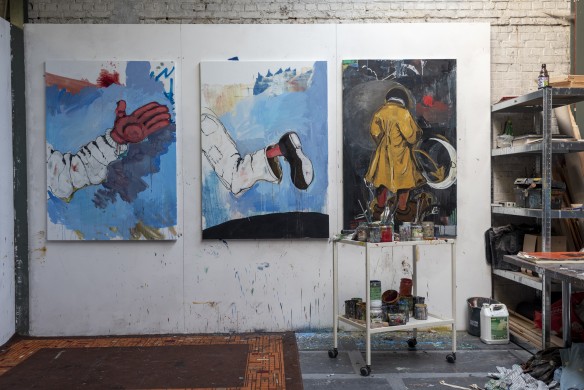You describe yourself as a painter at heart. What attracts you so much to painting?
For me, painting has the power to elevate banal things into something symbolic. I find that incredibly beautiful: the mundane given meaning by depicting it. And additionally: the fact that this meaning is anything but fixed. I do not consider my paintings to be my own. I make them, they emerge from my coincidences and my own frame of reference. But everything that happens afterwards, the meanings assigned to them, I have little to do with. And that's exactly what I like about it.
Do you have topics that particularly fascinate you?
Currently I find it very fascinating to introduce traces of an absent self in a work. For example, by painting a bed with an imprint in the sheets of someone who has just left, or a foot of a person walking out of the frame. Such elements bring you to imagine a world outside of the painting.
Do you prefer to work figuratively or abstractly?
Figuration and abstraction automatically awaken each other, so to me, this question is irrelevant. The same inspiration can lead to both figurative and abstract work - Philippe Vandenberg is a good example of that. Children don't even make that distinction, by the way; they sometimes even find abstract work easier to interpret.
What is the biggest difference between teaching children and adults?
Adults believe everything you say, children ask a lot more questions. As we grow up, we unlearn to draw. A child who draws a bird as a square with two legs is told that is wrong, even though it perfectly represents what that bird looks like to them. By doing so, drawing is misused as something educational, while it is more a way of thinking, processing and considering reality. The result: by the time we reach adulthood, we are so preoccupied with the result that we have lost that very valuable contemplative aspect. As a teacher, I especially want to free people from that result-oriented attitude.
I once did an exercise in which I wiped out the participants' charcoal drawings halfway through, with no warning. Just to show: look, it's messed up, now you can let go and really start.
How do teaching and painting relate to each other for you?
For me, it's a total package. Teaching is kind of studying your own thoughts: what do I want to pass on to others? This contemplation is just as much a part of my artistic practice. The artists who inspire me as a painter are also the ones who inspire me to invent exercises.
Do you feel the urge to experiment with other artistic disciplines as well?
At this moment, painting still holds so many secrets for me that I want to deal with it exclusively for now. If I would work outside of painting in the future, I feel most attracted to theater. I see a lot of resemblances between theater and painting: composition, light, strong images and impressions play an important role in both. The drama also attracts me: I feel that in theater you can, or even have be more literal to get your message across, while paintings are expected to have this veil over it, humble yet pretentious.
Painting is pretentious to you?
The painting world is. Those big openings and galleries, it all looks so glamorous and romantic. Until after a while you see how commercial it actually is. Artists are put in the spotlight for the wrong reasons, flimsy things are praised to the skies. And you wonder: am I really the only one who sees is this way? You're not.
For me, a big part of the art world lacks sincerity and respect. Every artist who goes public with their work, puts themselves in an extremely vulnerable position. All this is taken for granted, while artistic practices need to be taken seriously and be get a safe environment. And what about all these endless non-discussions about "is this regular art or not" - who cares? As if talking about art can only be done in a pompous, inaccessible way. Everyone makes associations with a work of art, so everyone can talk about art in a concrete way. It really isn't any more complicated than that.
In whose studio would you like to be a fly on the wall sometime?
In the first studio in history, that of cave paintings in prehistoric times. I would love to know what that was like, that first drawing. Visual art and history are also very much intertwined for me. If you paint a book, there is always an echo in there of the first book that was ever depicted. If you look at it like that, history is something very dynamic and alive: it repeats itself, makes associations possible, makes our frame of reference richer.
What was the last expo that touched you?
The last edition of Documenta. There I really noticed the turnaround I have been waiting for for a long time: the big institutions and accumulated Western view of art were completely ignored, and made room for a collective approach. Very liberating and inviting to me, although I noticed that not everyone feels the same way. Art is a spectrum that is infinitely broad, but 95% of it is usually brushed aside as outsider work. Documenta questioned this definition just the tiniest bit, and yet so much people felt outraged by it.
What would you do when you get unlimited funds to organize the workshop of your dreams?
Then I take my group to Florence. That city is full of secrets and hidden layers that fascinate me endlessly. During the day we would turn the city upside down, and in the evenings we'd set up a Breugelian table in a large vineyard, where we talk and draw together for hours.
Photo credit: Manon Jejcic
Got curious after reading this interview?



